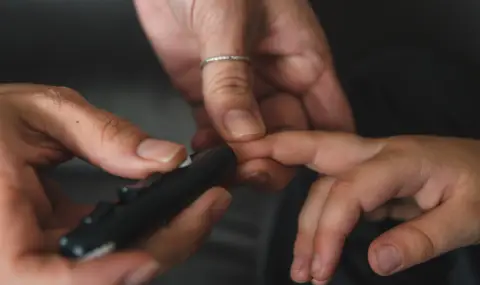In nearly 90% of cases of diabetes in children, the disease is diagnosed in the third stage, Dr. Natasha Yaneva, endocrinologist at the Clinic for Children's Endocrinology and Metabolic Diseases at the Specialized Hospital for Active Treatment of Children's Diseases “Prof. Ivan Mitev“. On October 1, the facility will begin screening for type 1 diabetes, targeting children who have direct relatives diagnosed with diabetes.
Younger and younger children are being diagnosed with type 1 diabetes
Childhood diabetes is most often type 1 and it is an autoimmune disease. At the moment, the reasons for its appearance are not known, but the cases are becoming more frequent. The onset of the disease among children is usually at the age of 11-14 years, but we are increasingly seeing its onset among much younger children – under the age of 6, Dr. Yaneva also said. The doctors' concern is that, both in the world and in Bulgaria, the diagnosis of the disease is late, and nearly 27 percent of children are diagnosed when a severe and life-threatening condition - diabetic ketoacidosis - appears. Diabetic ketoacidosis often has residual effects on the brain and kidneys. For this reason, early diagnosis is extremely important. According to the latest global criteria for the presence of type 1 diabetes mellitus, the presence of two positive autoantibodies is accepted, Dr. Yaneva added. Usually, in nearly 90 percent of cases, we catch the disease in the third stage, and then it is mandatory to apply insulin treatment in order to save the child's life, she added.
Recognizing the symptoms
Parents find that there is a problem when children start drinking water very often, urinate often, including at night, and urinate at night, Dr. Yaneva pointed out. Including children who are at the age of puberty and are affected by the disease, they begin to urinate at night, and this is already a relatively late detection of the disease. Other symptoms that betray the presence of type 1 diabetes are increased or preserved appetite, but weight loss, as well as increased fatigue in the child, she added.
Late diagnosis
During the delay in diagnosis, 80% of the beta cells of the pancreas have already been destroyed, and the remaining 20% produce insulin that is not sufficient for the body. Insulin is an important hormone for growth, but also for the entire human organism. The earlier the diabetes is detected, the better the subsequent control of the disease, and the residual beta-cell function is preserved for a longer time, added Dr. Yaneva. According to her, it is not known what is the exact cause of the appearance of this type of diabetes, nor is it known what would be the correct prevention for pregnant women.
Screening
Through the screening we want to do, we aim to establish the disease in the first or second stage, since there is already immunotherapy that can be applied to patients, pointed out Dr. Yaneva. We want to prevent the occurrence of diabetic ketoacidosis or coma, added the doctor. Screening will not be mass, but will be targeted only at children who have direct relatives with diabetes. According to her, for children who have direct relatives with diabetes, the risk of developing diabetes is 15 times higher than the risk for other children.
The screening will start on October 1 and will last for 22 months. The children will have their blood drawn, which will be tested to see if the child has two positive autoantibodies. If they are present, it means the child has type 1 diabetes, she added. We can offer a treatment that is not included in the screening, but is within the project "Screening for the early diagnosis of type 1 diabetes in children with a first-degree relative with type 1 diabetes". The project is part of the program "Internal research projects with potential for innovation or knowledge transfer - 2024". of the Medical University – Sofia.
